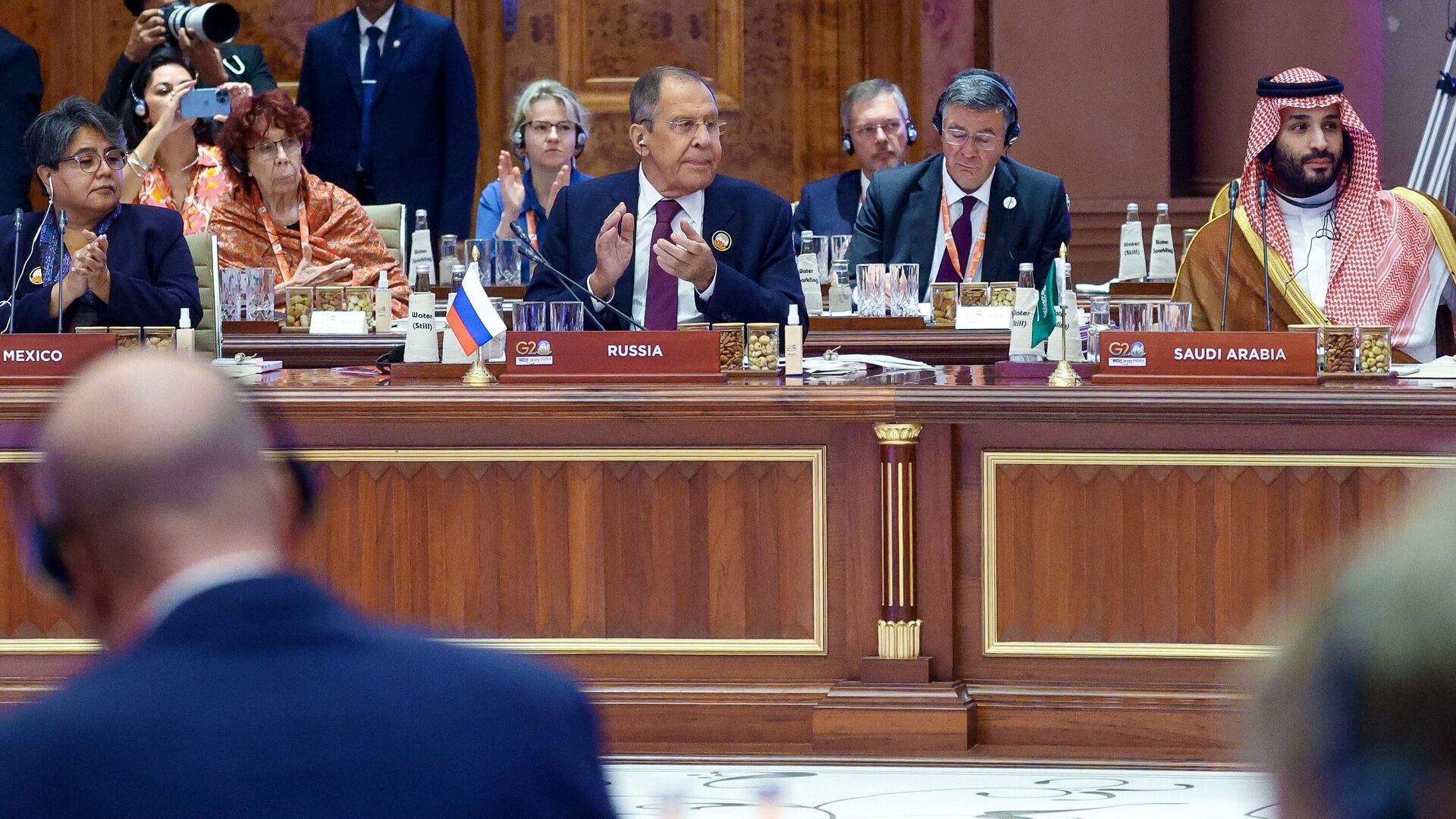https://sputnikglobe.com/20230909/g20-split-over-ukraine-sign-of-battle-between-us-unipolarity-rising-multipolar-world-order-1113241211.html
G20 Split Over Ukraine Sign of Battle Between US Unipolarity, Rising Multipolar World Order
G20 Split Over Ukraine Sign of Battle Between US Unipolarity, Rising Multipolar World Order
Sputnik International
Leaders and representatives of the world’s 20 largest economies met in New Delhi Saturday, reaching a compromise on a joint declaration on global priorities by leaving out Western-proposed criticism of Russia over its military operation in Ukraine. Sputnik spoke to experts to get a sense of what the declaration's "consensus language" really means.
2023-09-09T19:36+0000
2023-09-09T19:36+0000
2023-09-09T20:03+0000
narendra modi
russia
ukraine
new delhi
g20
african union (au)
summit
declaration
statement
g20 summit 2023
https://cdn1.img.sputnikglobe.com/img/07e7/09/09/1113241511_0:181:2997:1867_1920x0_80_0_0_f15ada61c7e79b6960a38eb83da0b245.jpg
Day one of the two-day G20 summit in New Delhi, India wrapped up on Saturday, with the intergovernmental forum’s members reaching a consensus on economic development, climate change, and pledging to work together toward peace, security and conflict resolution.A Russian official told journalists that “very complex” talks took place on formulating the consensus-based joint statement, with the BRICS bloc and its partners “refusing to accept Western narratives” on the crisis in Ukraine.The text of the 83-point statement refrained from condemning Russia’s military operation in Ukraine, instead underscoring the need for “all states” to “act in a manner consistent with” the UN Charter, and highlighting the negative global economic and security impact of the ongoing crisis. The text of the document called for a resumption of the Black Sea Grain Deal, but also measures to ensure the “immediate and unimpeded deliveries of grain, foodstuffs, and fertilizers/inputs from” from both Russia and Ukraine, including “to meet the demand in developing and least developed countries, particularly those in Africa.”The compromise text is a far cry from apparent expectations by the US and its allies to ram through a declaration echoing the one from the G20 Summit in Bali last year, which condemned Russia’s “aggression” in Ukraine and demanded the “complete and unconditional withdrawal” of Russian forces, without making any mention of the US and NATO's role in fomenting, sparking and fueling the conflict.Russian Foreign Minister Sergey Lavrov, who is representing Russia at New Delhi summit, warned last week that Moscow wouldn't accept “a G20 summit declaration if it does not reflect Russia’s position on global crises,” and stated that if Western countries wanted to “rewrite the G20’s mandate” to discuss global geopolitical hotspots, Russia would be happy to remind them of other conflicts taking place today which are “rooted in wars unleashed by the West.”G20 as Global Geopolitical Battleground“The G20 summit in New Delhi turned to be a new platform for conflict rather than for cooperation for two major trends worldwide,” author and columnist Oraib Al-Rantawi, founder and director general of the Amman-based Al Quds Center for Political Studies, told Sputnik.Robinder Sachdev, a geopolitical and economic diplomacy analyst, founder and president of the Imagindia Institute, a New Delhi-based think tank, agreed with this assessment, telling Sputnik that the split over Ukraine is a "reflection of the reality" that the G20 is divided.Black Sea Grain Deal: ‘Devil is in the Details’“I think there are a few actions that should be seen to happen beyond just these demands,” Professor Fulufhelo Netswera, executive dean of the Faculty of Management Sciences at South Africa’s Durban University of Technology, told Sputnik, commenting on the statement’s section on the need to secure Russia’s interests before the Black Sea Grain Deal can be resumed.“Some of these demands really relate to the need for the Russian Agricultural Bank to be reconnected to the SWIFT banking system, as well as for Russia to be able to export its own fertilizers and its own food,” Dr. Netswera recalled.Al-Rantawi, for his part, said that while the apparent willingness to compromise on the Black Sea Grain Deal is significant in its potential to prevent a new global food crisis, it is merely “step forward,” since it remains unclear “when it comes to the final results and whether it will be possible to conclude a deal with Moscow or not, because so far the devil’s in the details.""We don’t know how exactly things would be solved and tackled during the expected negotiation around the new proposal by the summit and by [UN Secretary General Antonio] Guterres himself,” the Jordan-based researcher said."I think the bottom line is that, big principles are out there as to what should be and where the global order should be heading," Sachdev said of the language regarding the grain deal's revival. "In terms of the implementation of the Grain Deal, I think it'll depend upon the concerned parties and their self-interest if the deal is 'switched on'. It will depend on the core interests of the parties involved before the Grain Deal is drawn."Invitation to the G20 for AfricaSaturday’s summit meetings included an announcement by Indian Prime Minister Narendra Modi on the African Union’s formal invitation into the G20 as a permanent member.Dr. Netswera believes the invitation is clearly related to the recent successful diplomatic overtures of the expanded BRICS bloc, which included the invitation of six new members, including two African countries, at the bloc's own summit last month, and Western countries’ efforts to avoid seeing the G20’s standing diminished.That said, Netswera emphasized that African countries will have a great deal of work to do to strengthen the African Union and collectively champion their own interests if they want the international community to respect Africa’s interests and take the continent seriously.
https://sputnikglobe.com/20230909/g20-declaration-on-ukraine-a-blow-to-western-countries-1113237661.html
https://sputnikglobe.com/20230904/grain-deal-gas-hub--de-dollarization-what-signal-do-putin-erdogan-talks-send-to-west-1113117752.html
https://sputnikglobe.com/20230909/modi-announces-inclusion-of-african-union-to-g20-as-permanent-member-1113222970.html
https://sputnikglobe.com/20230831/eu-must-rethink-africa-policy-after-military-takeovers-in-niger-gabon---borrell-1113032696.html
russia
ukraine
new delhi
Sputnik International
feedback@sputniknews.com
+74956456601
MIA „Rosiya Segodnya“
2023
News
en_EN
Sputnik International
feedback@sputniknews.com
+74956456601
MIA „Rosiya Segodnya“
Sputnik International
feedback@sputniknews.com
+74956456601
MIA „Rosiya Segodnya“
g20, declaration, ukraine, compromise, russia, west, nato, new delhi, india, summit
g20, declaration, ukraine, compromise, russia, west, nato, new delhi, india, summit
G20 Split Over Ukraine Sign of Battle Between US Unipolarity, Rising Multipolar World Order
19:36 GMT 09.09.2023 (Updated: 20:03 GMT 09.09.2023) Leaders and representatives of the world’s 20 largest economies met in New Delhi Saturday, reaching a compromise on a joint declaration on global priorities by leaving out Western-proposed criticism of Russia over its military operation in Ukraine. Sputnik spoke to experts to get a sense of what the declaration's "consensus language" really means.
Day one of the two-day G20 summit in New Delhi, India wrapped up on Saturday, with the intergovernmental forum’s members reaching a consensus on economic development, climate change, and pledging to work together toward peace, security and conflict resolution.
A Russian official
told journalists that “very complex” talks took place on formulating the consensus-based joint statement, with the BRICS bloc and its partners “refusing to accept Western narratives” on the crisis in Ukraine.
The
text of the 83-point statement refrained from condemning Russia’s military operation in Ukraine, instead underscoring the need for “all states” to “act in a manner consistent with” the UN Charter, and highlighting the negative global economic and security impact of the ongoing crisis. The text of the document called for a resumption of the Black Sea Grain Deal, but also measures to ensure the “immediate and unimpeded deliveries of grain, foodstuffs, and fertilizers/inputs from” from
both Russia and Ukraine, including “to meet the demand in developing and least developed countries, particularly those in Africa.”
The resolution also expressed the G20’s support for “all relevant and constructive initiatives that support a comprehensive, just, and durable peace in Ukraine that will uphold all the Purposes and Principles of the UN Charter for the promotion of peaceful, friendly, and good neighborly relations among nations in the spirit of ‘One Earth, One Family, One Future.’”
The compromise text is a far cry from apparent expectations by the US and its allies to ram through a declaration echoing the one from the G20 Summit in Bali last year, which condemned Russia’s “aggression” in Ukraine and demanded the “complete and unconditional withdrawal” of Russian forces, without making any mention of the US and NATO's role in fomenting, sparking and fueling the conflict.
Some Western media could not help but express disappointment in the New Delhi declaration’s diplomatic tone, with one outlet going so far as to call it a “blow to Western countries that have spent the past year attempting to convince developing countries to condemn Moscow and support Ukraine.”
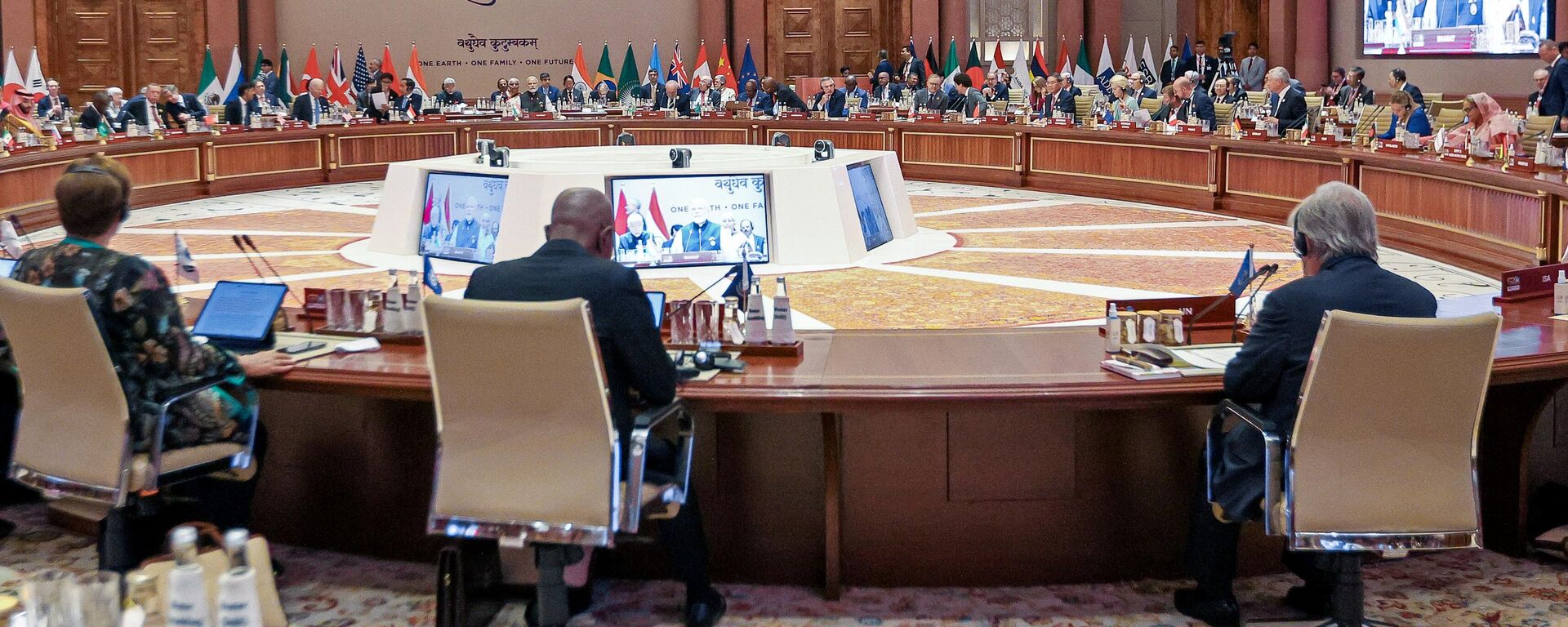
9 September 2023, 16:28 GMT
Russian Foreign Minister Sergey Lavrov, who is representing Russia at New Delhi summit,
warned last week that Moscow wouldn't accept “a G20 summit declaration if it does not reflect Russia’s position on global crises,” and stated that if Western countries wanted to “rewrite the G20’s mandate” to discuss global geopolitical hotspots, Russia would be happy to remind them of other conflicts taking place today which are “rooted in wars unleashed by the West.”
G20 as Global Geopolitical Battleground
“The G20 summit in New Delhi turned to be a new platform for conflict rather than for cooperation for two major trends worldwide,” author and columnist Oraib Al-Rantawi, founder and director general of the Amman-based Al Quds Center for Political Studies, told Sputnik.
“The first one pushing forward the new world order, a multi-polar world order, and the other one led by the United States. The competition was very clear. The balance of power within the G20 is very sensitive between China, Russia and their friends and allies on the one hand, and the G-7 group on the other hand by the United States, of course,” Al-Rantawi said, commenting on the compromise around Ukraine and other issues.
Robinder Sachdev, a geopolitical and economic diplomacy analyst, founder and president of the Imagindia Institute, a New Delhi-based think tank, agreed with this assessment, telling Sputnik that the split over Ukraine is a "reflection of the reality" that the G20 is divided.
Black Sea Grain Deal: ‘Devil is in the Details’
“I think there are a few actions that should be seen to happen beyond just these demands,” Professor Fulufhelo Netswera, executive dean of the Faculty of Management Sciences at South Africa’s Durban University of Technology, told Sputnik, commenting on the statement’s section on the need to secure Russia’s interests before the Black Sea Grain Deal can be resumed.
“Some of these demands really relate to the need for the Russian Agricultural Bank to be reconnected to the SWIFT banking system, as well as for Russia to be able to export its own fertilizers and its own food,” Dr. Netswera recalled.
“But beyond those issues, there are very important fundamental issues that are not spoken about, and those relate to support for the war, especially from the West, because for as long as the West continues to support Ukraine on the war question, I think Russia will not yield as far as some of these issues are [concerned],” the South African academic stressed.
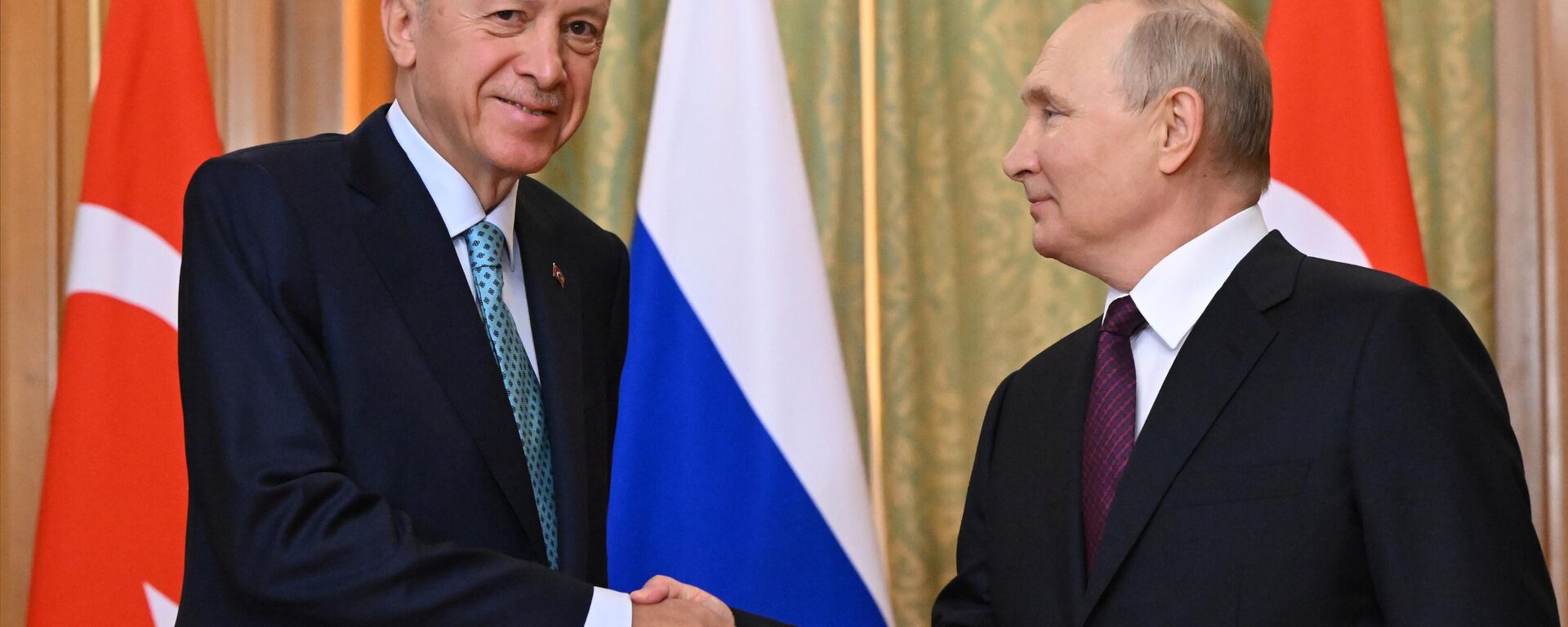
4 September 2023, 19:12 GMT
Al-Rantawi, for his part, said that while the apparent willingness to compromise on the Black Sea Grain Deal is significant in its potential to prevent a new global food crisis, it is merely “step forward,” since it remains unclear “when it comes to the final results and whether it will be possible to conclude a deal with Moscow or not, because so far the devil’s in the details."
"We don’t know how exactly things would be solved and tackled during the expected negotiation around the new proposal by the summit and by [UN Secretary General Antonio] Guterres himself,” the Jordan-based researcher said.
"I think the bottom line is that, big principles are out there as to what should be and where the global order should be heading," Sachdev said of the language regarding the grain deal's revival. "In terms of the implementation of the Grain Deal, I think it'll depend upon the concerned parties and their self-interest if the deal is 'switched on'. It will depend on the core interests of the parties involved before the Grain Deal is drawn."
The Indian observer emphasized that while the G20's statement on the Grain Deal is based on things that "should be," the reality is that "there are many things in this world that should be," and that ultimately, "the implementation of anything depends upon the players and stakeholders involved."
Invitation to the G20 for Africa
Saturday’s summit meetings included an announcement by Indian Prime Minister Narendra Modi on the African Union’s formal invitation into the G20 as a permanent member.
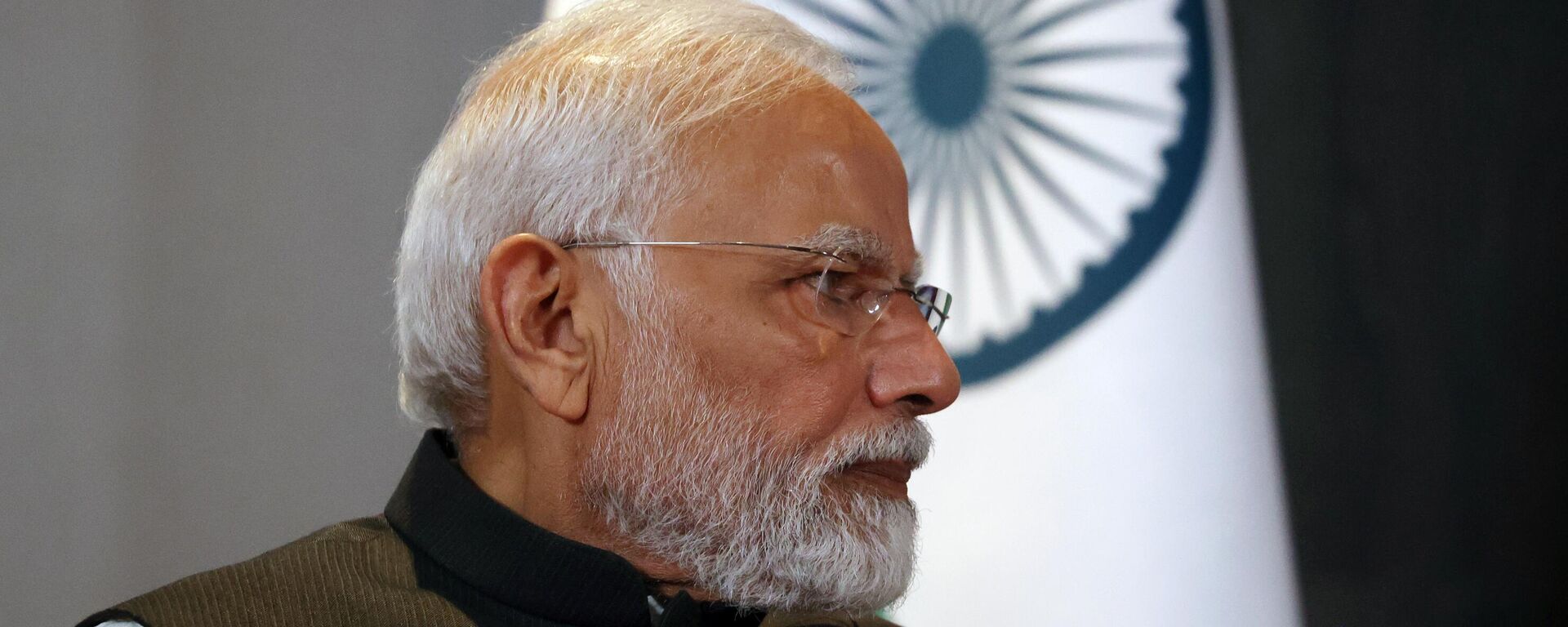
9 September 2023, 06:07 GMT
Dr. Netswera believes the invitation is clearly related to the recent successful diplomatic overtures of the expanded BRICS bloc, which included the invitation of six new members, including two African countries, at the bloc's own summit last month, and Western countries’ efforts to avoid seeing the G20’s standing diminished.
“It is a strategic move as far as I’m concerned…because as it had just happened…six countries in particular had been invited to become full members of the BRICS. Beyond that, we have over 40 countries among the developing countries who are interested in becoming members of BRICS. Now, that diminishes the prominence of the G20 and its standing as the prominent multilateral organization, and therefore this invitation of the African Union to become a permanent member automatically plays into the hands of the Africans,” the academic noted.
That said, Netswera emphasized that African countries will have a great deal of work to do to strengthen the African Union and collectively champion their own interests if they want the international community to respect Africa’s interests and take the continent seriously.
Al-Rantawi broadly agreed, saying that while inviting the African Union into the G20 was likely led by India, Russia and China, the G7 countries “accepted” the idea to try to “drag Africa to be close to this bloc rather than pave the way for more influence for Russia and China. We saw recently in the Sahel and West Africa that there is an increasing influence of Russia in Mali, in Niger, Burkina Faso, West Africa and Gabon as well,” the observer said, pointing to the rising anti-Western and anti-neocolonial attitudes in many African countries.
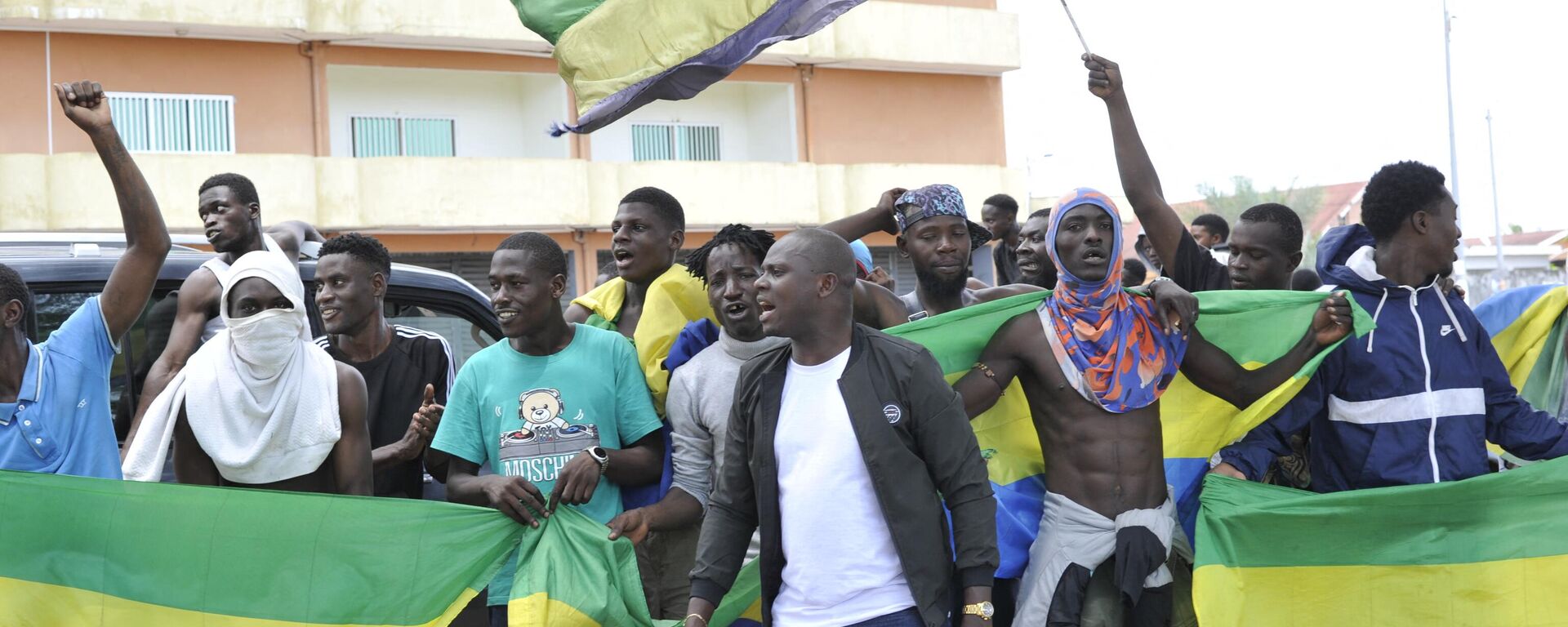
31 August 2023, 23:26 GMT
